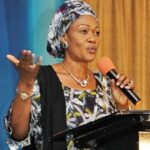The advocacy for gender equality has garnered more strength as a civil society group has recommended wide-ranging constitutional reforms to enhance women’s political representation.
The NGO is demanding at least 35 per cent reservations for women in the composition of courts, commissions, bodies, tribunals and others as minimum core standard.
The Legal Defence and Assistance Project (LEDAP) in its report to the National Assembly obtained by Daily Trust, is also seeking the mainstreaming of the provisions of the country’s National Gender Policy of 2006, CEDAW and African Charter Protocol, which suggested reservation of at least 35 per cent of political and public positions for women.
The project entitled ‘Increasing Women’s Political Participation through Advocacy for Legal Reforms’, was developed by LEDAP in partnership with the National Democratic Institute (NDI) with support of the U.S Agency for International Development (USAID) under the Supporting Advancement of Gender Equality (SAGE) programme aimed at increasing women’s participation in political processes.
LEDAP is further demanding the promotion of gender neutrality and equality through the text and language of the constitution by removing gender-specific pronoun “he” and also “chairman” and adopt gender-neutral terms such as “chairperson”, “any persons” and “such persons”.
To holistically institutionalize non-discrimination of women, the organization is seeking for the change of the Federal Character Commission (FCC) to Gender and Equal Opportunities Commission “and redefining federal character in the interpretative section to include gender diversity.”
They are demanding addition to sub-section 7 of Section 147 of the constitution to give equal opportunity to both genders in the appointment of ministers by the president to read: “the appointment of ministers by the president shall consist not less than 35% minimum in governance.”
The NGO also seeks to indicate 35 per cent reservation for women, amendments in sections 49 and 91 of the Nigerian Constitution, 1999, which reads that ‘the House of Representatives shall consist of 360 members representing constituencies of nearly equal population as far as possible, provided that no constituency shall fall within more than one state, and a state assembly consisting of three or four times the number of seats which that state has in the House of Representatives divided in a way to reflect, as far as possible nearly equal population.’
It further demands that paragraphs (g) and (h) in Section 222 of the constitution be amended for reservation of 35 per cent of its executive committee members or governing body of political parties, and that “position of chairman and secretary of political parties at any given time should be held by the different genders.”
The NGO also demands to be included in Section 223 (1) (b) of the constitution that rules of political parties must be amended to “ensure that candidates for election at all levels shall reflect the federal character of Nigeria of who at least 35 per cent shall be women.”
The NGO noted that since the restoration of democracy in the country, the political fate of women has plunged. For instance, in 1999, there was no female president of Nigeria or vice, but women had three senators out of the 109, 13 House of Reps members out of 360, no governor out of 36, one deputy governor out of 36, and 12 members of the state house of assemblies’ 990 members.
In 2003, there was no female president or vice, but there were four women senators, 21 House of Reps members, no governor, one deputy governor, and 12 House of Assembly members.
In 2007, there was no female president or vice, nine senators, 25 House of Reps members, no governor, six deputy governors and 57 state assembly members.
In 2011, there was no female president or vice, seven senators, 19 House of Reps members, no governor, one deputy governor and 57 state house of assembly members,
In 2015, there was no female president or vice, eight senators, 20 House of Reps members, no governor, four deputy governors, and 46 state assembly members.
In 2019, no female president or vice, eight senators, 11 House of Reps members, no governors, three deputy governors, and 44 state assembly members.
Speaking on the recommendations, the Senior Programme Manager of LEDAP, Pamela Okorigwe, called for increased reportage of women in political spaces to encourage the movement for a gender quota in the current amendment ongoing in the National Assembly. She cited Rwanda and Burundi as countries that have constitutionalized the female quota.
Similarly, the Executive Director, Justice and Rights Initiative, Mr Justin Gbagir, said policy and legal framework are the best means to address the gender imbalances in the country’s electoral process.
“Women’s political participation and gender equality in elections can be promoted through both international commitments and domestic legal provisions,” he said.
But Ali Zubair Esq said the move can also be viewed as discriminatory to men if the demands are made part of the constitution.
He argued that women can attain political and public positions by way of moral persuasion or by going out there to engage people and prove themselves.
“By way of comparison, is there any developing country, maybe Ghana or South Africa or any of the countries, that has made such a constitutional provision? In Liberia for instance, was there a constitutional provision before Sirleaf Johnson emerged as president?
“In a country like the USA things like that are actually not written, but women themselves go out there to prove themselves. Arab countries like Egypt and Lebanon, tend to also find women being elected into offices. I don’t think making it a constitutional provision is a way out,” he averred.
He further submitted that the gender demands are similar to the issue of zoning and rotation of the office of the president, which should only be made by the political parties and not the constitution.
“If the political parties can make their own policies or constitutions, fine and good because it is from there that candidates are screened and look for elective offices.
“From the purchase of forms and indication of interest forms, they would say such forms are reserved for women, that is fine and from there they go out to the wider society, meet other people and canvass for votes. And if they get elected, fine.
“Rather than making it a constitutional provision, itself, the law, would be discriminatory. For me, I don’t see it as a way out of the present quagmire,” he said.




